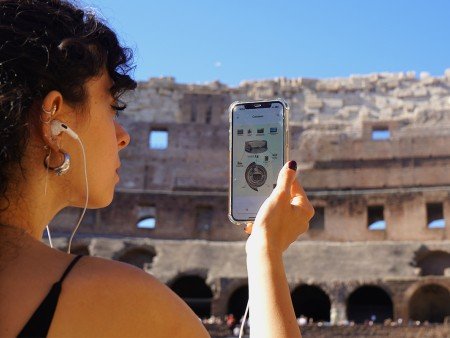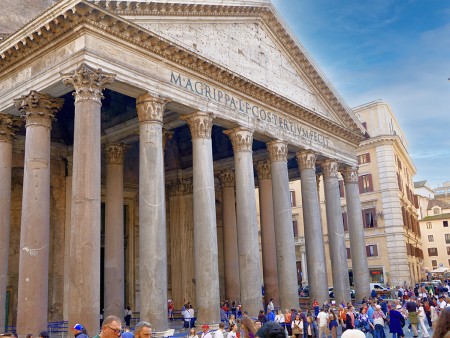Colosseum Arena Tour: The spectacle of Propaganda in Imperial Rome
Skip-the-line Colosseum Tour with Arena Floor: Roman Forum and Palatine Hill in Rome
Step back in time with a small group in Imperial Rome on our Colosseum tour with skip-the-line tickets and arena experience. Relive a day of gladiator combat in the largest amphitheater (as the Romans called the Colosseum) built in the empire, sibling to many others still standing today in Verona, Italy, or Arles, France.
Step into the Colosseum with our special access tour for small groups, directly onto the arena floor, just as the gladiators did. They would enter the arena in a parade, paying homage to the emperor seated in his private box, from where he wielded his power as the ultimate judge of the contests, able to grant mercy to a valiant but defeated combatant in the final bout, or condemn them to death at the victor's hand.
The emperor's power over the arena, celebrated in the Colosseum before 50,000 spectators, was clearly symbolic of absolute dominion over Rome and its people.
Relive the (terrifying) thrill of gladiators emerging from the underground onto this wooden stage covered with sand (in Latin, "arena") where they fought for their lives. They died like beasts under the indifferent gaze of Roman citizens.
Understand with our brilliant guide how the Romans built the Colosseum in just ten years, how they organized work into well-coordinated teams, how they transported travertine from the quarries of Tivoli, 40 km from Rome. We know they also used machines, with winches powered by the strength of animals and slaves, as evidenced in some reliefs of the time.
Explore the colossal, functional, and innovative architecture of the Colosseum, which extolled the emperor's grandeur, his power, and his generosity, as gladiatorial contests were free. The entrance ticket, not a skip-the-line back then, indicated which entrance to use among the 76 numbered ones, with Roman numerals still visible today carved above the arches at street level of the Colosseum. To curry favor with the people and be recognized as the supreme prince, the emperor financed gladiator shows with surprising frequency: they took place for about 100 days a year.
Explore the architecture of the Colosseum, 50 meters high, elliptical in shape, with a greater capacity than a circular one, where about 50,000 people could gather on the steps, much like a modern stadium. Discover how the imposing and ingenious architecture of the Colosseum was designed specifically for gladiatorial combat, based on that of classical theaters. Gladiator shows, unlike theatrical ones with scenes and dialogues directed towards an audience arranged in a semicircle, could be seen from any angle.
Witness, along with the Romans of the time, arranged according to social hierarchies on the five original levels, the ritual of collective blood celebrated in the Colosseum arena. Observe the family members and high-ranking officials seated in the box, located at the point of greatest visibility, alongside the emperor, who here meets his people and seduces them with the propaganda of an empire ever larger and richer.
He offers the crowd gruesome entertainment, showcasing exotic and fantastic animals from far-flung lands annexed to the empire, men with unusual physical abilities fighting with unusual weapons and tactics.
Our qualified and passionate guide to the history and archaeology of Rome will recount the social and political dynamics of Imperial Rome with you. A complex and multiethnic city, with over a million inhabitants, a hub, and partly a destination, of long-distance trade, of goods and merchandise transported and exchanged to and from the various provinces of the Roman Empire. At the time, it extended from present-day Romania to Morocco, from Egypt to Great Britain.
The tour of the Roman Forum: the political and religious center of Ancient Rome
Pause with our expert and communicative guide on the cobblestones still marked today by the wheels of carts passing along the ancient Via Sacra, exploring the buildings flanking it. Admire and understand the function of the House and the Temple of the Vestals, of the Senate where laws were drafted during the five centuries of the Roman Republic. Visualize, with the reconstructions of our expert, the grandeur of the ancient pre-Christian basilicas where the Romans held crowded public trials from which great lawyers like Cicero emerged.
Relive the last days and the historical and human life of G. Caesar before the temple to the Divo Julius, built by his nephew Octavian Augustus, in the center of the Roman Forum, in the corner of the square where his body was cremated after his assassination.
Conclude the visit on the Palatine Hill with magnificent views of Rome
Finally, on the tour, you will inhabit the immense and luxurious spaces of the imperial palaces, the Stadium, the palace of Domitian, the temple of Apollo near the House of Augustus, next to the House of Livia. Discover and imagine on the hill in the Republican era the villas of the Roman aristocracy, of consuls, senators, and illustrious lawyers, from Mark Antony and Octavian Augustus to Cicero. They lived here for the spectacular view that the wide hill offered over the valley of the Roman Forum, the Circus Maximus, the Tiber River.
On the Palatine, you will also visit the oldest archaeological evidence of Rome: the Huts of Romulus and Remus, from the 8th century BCE, associated with the myth of the foundation of Rome.
NOTE: Under new rules, Colosseum skip the line tickets must have the full name of every visitor.
Group tour
13 max.
TOUR INCLUDES
Skip-the-line tickets for the gladiators' arena of the Colosseum
Highly proficient English-speaking guide; local and licensed
lexicon.1099
lexicon.1100
By submitting this form I agree to the processing of my personal data as indicated in the privacy policy










